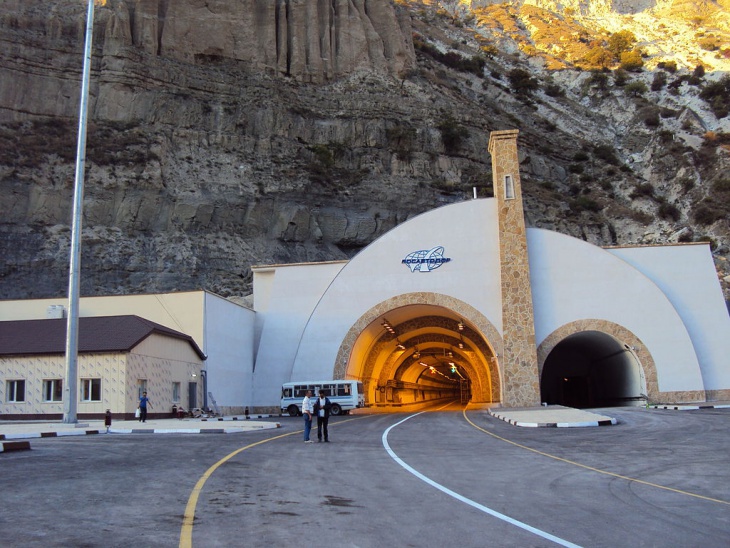
Dagestanis Say Russian Government Ignores Their Rights While Voicing Concern Over Rights of Ukraine’s Ethnic Russians
Publication: Eurasia Daily Monitor Volume: 11 Issue: 220
By:

On November 26, a counter-terrorist operation regime was lifted in Untsukul district, located in the mountains of Dagestan. Introduced back in March, the regime was lifted, but the Gimry tunnel remains closed for through traffic. The Gimry tunnel connects the mountainous districts of the republic to the plains, in particular to Makhachkala, the capital. The tunnel was closed in September as the government stepped up security in the area (TASS, November 26). The fact that the tunnel remains closed even after the formal lifting of the counter-terrorist operation regime means that the security situation is still precarious and the government distrusts the locals.
Nor is the local population in Untsukul district happy with the government. Locals became especially vocal about their grievances after the counter-terrorist operation regime was lifted and a journalist with the Dagestani weekly newspaper Novoe Delo, Murad Muradov, managed to gain access to the area despite the obstacles. Most notably, the affected residents of the village of Vremenny (Temporary), who were resettled from the embattled village of Gimry, repeatedly compared their circumstances to that of ethnic Russians in Ukraine.
After the residents of Vremenny were forced to leave their homes, government forces destroyed or looted much of their personal belongings along with such items as an expensive electrocardiograph machine at a local medical facility. “On [Russian] TV they show how the Ukrainian army marauds in Donetsk and Luhansk,” people in Vremenny told the Novoe Delo reporter. “But nobody is showing on TV how our own army behaved toward its own citizens—us.” Vremenny village has a population of more than 800 people. The government displaced the residents of the village without providing them with temporary shelter, so they had to rely on their own resources and relatives to survive.
They did not even receive any humanitarian aid, according to what they told the reporter from Novoe Delo. “On TV they constantly show how Russia sends humanitarian aid to the Ukrainians,” the angry people told Novoe Delo. “Not only were we not allowed to take warm clothes from our homes, but the government even refused to allow a truck with humanitarian aid from Makhachkala to go into Gimry, where the majority of the population of Vremenny gathered.” The government promised compensation for people who lost their belongings and their homes, and a special commission was created to assess the damage. By doing so, the government implicitly acknowledged that the government forces inflicted damage on the people in the village. However, the locals say that previous damage assessments had not resulted in compensation and they do not believe the latest commission will be any better. The important caveat is that compensation has been promised only to the people whose relatives were not implicated in having ties to the rebels. This means that not only the rebels themselves, but their relatives are targeted by the government in what appears to be an explicit act of collective punishment (ndelo.ru, November 30).
One of the most interesting aspects of the government actions in Untsukul district of Dagestan is the fact that the locals haves started to compare Moscow’s attitude toward the ethnic Russians in Ukraine to its attitude toward themselves, which they see as less favorable. Russia’s foreign policy rhetoric about “protecting civilians in eastern Ukraine from the fascist junta in Kyiv” now seems to be backfiring at home, in the North Caucasus, where Russian government forces have habitually engaged in flagrant human rights abuses against their own citizens in past years. Moreover, the analysis suggests that the Russian government is substantially more abusive in republics with smaller ethnic-Russian populations (see EDM, November 24). In other words, Moscow has persecuted people on the basis of ethnicity for years, turning the North Caucasus into a war zone long before it did so in eastern Ukraine.
A report from the village of Vremenny indicates that Russian forces from outside Dagestan were deployed to carry out the special operations at the height of the counter-terrorist operation regime and were replaced with the Dagestani forces after the counter-terrorist operation regime was lifted. This adds an ethnic spin to the conflict, as ethnic Russians seem to have carried out reprisals against non-Russian Dagestanis.
The government claims that 14 insurgents were killed in the area during the counter-terrorist operation regime, but the evidence is sketchy, and this hardly justifies the mistreatment of civilians. On November 28, Dagestan’s governor, Ramazan Abdulatipov, said police had found several “seven-story dugouts” in the village, and the rebels who hid in those dugouts “killed dozens of children.” The Untsukul district administration later denied that such dugouts had been found in the village (chernovik.net, December 1).
The police detained four individuals from the village of Vremenny, but three of them were subsequently released without charges and the fourth remains in custody, despite police denials. One of them, 62-year-old Murtazali Shamilov, was arrested on September 18, and released on December 2, although the police never disclosed where he was held (Kavkazsky Uzel, December 4). Given the utter disregard for legal procedures, it is nearly impossible to take for granted virtually anything the Russian government and its representatives in Dagestan say about suspected rebels.
The Russian government’s propagandist rhetoric in regard to Ukraine has been noted at home, in the North Caucasus. People in the region increasingly ask why their government is so concerned about the rights of ethnic Russians in other countries, while the rights of Russia’s own citizens, especially if they are not ethnic Russians, are habitually violated. Even though Moscow certainly hopes that no one will be able to hold it accountable for supporting the rebels in Ukraine and brutally suppressing non-Russian ethnic groups at home, people in the North Caucasus are likely to remember this double standard and eventually demand an answer from the government.




